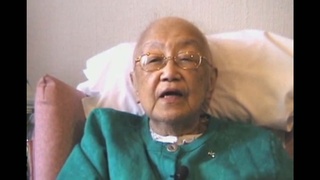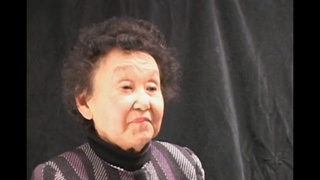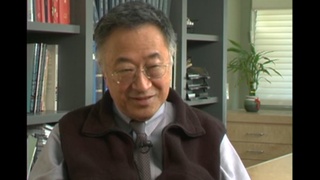Interviews
Anti-Japanese sentiment at the time of World War II
I*: Were you still in, at university when the war started?
Yes, I was at university when the war started, and at that time, at that time there was a lot of discrimination news in the papers, and usually it was from two politicians, and I guess it was because the Japanese didn't have the franchise in those days. One was Alderman Halford Wilson in the city council, and he was always saying something anti-Japanese, and the other was Howard Green, he was a conservative MP in Ottawa. And the reason I remember him 'cause he was a prominent United Church member and very prominent in the, in the news for the church things and the... then in the paper, he was always in the, saying something about the anti-Japanese in Ottawa in the parliament. But counteracting that, not many people, politicians spoke up for the Japanese, but there was a, when I was going to the university, there were a professor named Henry Angus, and he was, in his very thoughtful way, encouraged the students to ignore the anti-Japanese feelings in those days, and he really encouraged the Nisei students at university to, to go about their studies and try to not get too discouraged over the discrimination.
I: What do you remember about the start of the war? At the start of the war, I remember that we were all expected to go into the Canadian Officers' Training Corps at the universities, and we were all handed uniforms. And every, every... well, two or three times a week we went on marches and different exercises that we had to do, and did what we called some military training. There was a Colonel Shrum, he was a Physics professor, he was a colonel, and he was the head of the Canadian COTC training at the University of British Columbia.
*"I" indicates an interviewer (Teri Yamada).
Date: September 24, 2004
Location: Toronto, Canada
Interviewer: Teri Yamada
Contributed by: Sedai, the Japanese Canadian Legacy Project, Japanese Canadian Cultural Center
Explore More Videos

Why her parents came to Canada
(1918-2004) Interned in Slocan during World War II. Active member of the Japanese Canadian community.

Neighbor took care of hotel business during the World War II
(1918-2023) Nisei Japanese kabuki dancer


Family life in a Japanese Canadian internment camp in Slocan
(b. 1920) Incarcerated during World War II. Active member of the Japanese Canadian community

Lack of political power led to camps
(1924-2018) Researcher, Activist

Redress Movement in Canada
(b.1924) Japanese Canadian Nisei. Interpreter for British Army in Japan after WWII. Active in Japanese Canadian community

Choice to move east or go to Japan
(b.1920) Japanese Canadian Nisei. Established the Ikenobo Ikebana Society of Toronto


Institutionalization as a bad aspect of camp
(1924-2018) Researcher, Activist

State Department records show concern for treatment of Japanese American internees
(1924-2018) Researcher, Activist

Different tension between East Coast and Los Angeles
Japanese American Creative designer living in Japan

Remembering December 7, 1941
(1923-2011) Lawyer, MIS veteran, founder of Francis and Sarah Sogi Foundation

Meeting Japanese Americans from the mainland in MIS
(1923-2011) Lawyer, MIS veteran, founder of Francis and Sarah Sogi Foundation

Awareness of concentration camps as a Japanese American
(1923-2011) Lawyer, MIS veteran, founder of Francis and Sarah Sogi Foundation

His experiences in Chicago after WWII
(b.1929) Pioneer medical researcher in tissue transfer and organ transplantation.
